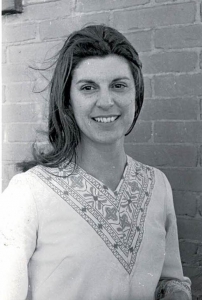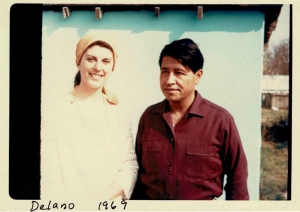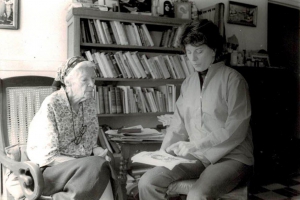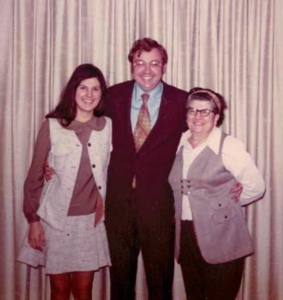
Biography: Marion Theresa Moses
 Dr. Marion Theresa Moses was born in Wheeling on January 24, 1936. She was the second of eight children born to Maron Moses and Mary Wakim Moses.
Dr. Marion Theresa Moses was born in Wheeling on January 24, 1936. She was the second of eight children born to Maron Moses and Mary Wakim Moses.
The family lived at 3118 McColloch St. in South Wheeling. The house was torn down when the W.Va. 2 freeway was built. A wall and steps are all that remain in that spot. Her brother, Maron Moses, who now resides in California, related that their father grew up in the same neighborhood and knew labor leader Walter Reuther.
As a child, Marion attended Immaculate Conception School in South Wheeling. The family attended Mass every Sunday at Our Lady of Lebanon Church in Center Wheeling. Both sets of grandparents were Lebanese immigrants.
Her father was a salesman for Weimer Meat Packing and Armour & Co. The family moved to Charleston, WV in 1946, when Marion was 10 years old and her brother was 6. The move occurred after their father was asked to open a branch of a frozen food distributor.
Marion’s interest in the medical field was sparked by the death of their 1-year-old sister, Margaret Rose, when Marion was 8.
Her brother said Marion later wrote a long article in the American Journal of Nursing, in which “she mentioned that when we were little, she knew her little sister didn’t have to die. It was one of the motivating factors in her becoming a doctor.”
Her brother recalled, “She wanted to become a doctor to start. Our dad said, ‘No, women become nurses,’ and for some reason, she listened. It was probably the last time in her life she ever listened to a man. There was a certain obedience to her. Cesar (Chavez) gave her a job and she went out and did it. My dad was the authority. She did what he said.”
Marion, who was always a good student, graduated from Georgetown University with a Bachelor of Science degree in nursing in 1957 and earned a master’s degree in nursing education from Columbia University Teachers College in 1960.
She worked as a nurse in Charleston and in California, but never lost sight of her original goal. As her brother pointed out, “She always wanted to become a doctor. She was 40 when she graduated from medical school, which was very remarkable at that time.”
Cesar
 Marion was working full-time as a nurse in California and studying English literature at the University of California at Berkeley when she learned of the farm workers movement. She met Cesar Chavez in October 1965 and soon became involved in the United Farm Workers union. She served for five years as an organizer, volunteer nurse, and health care administrator for the union, earning $5 a week, plus room and board.
Marion was working full-time as a nurse in California and studying English literature at the University of California at Berkeley when she learned of the farm workers movement. She met Cesar Chavez in October 1965 and soon became involved in the United Farm Workers union. She served for five years as an organizer, volunteer nurse, and health care administrator for the union, earning $5 a week, plus room and board.
Susan Drake, who was involved in the farm workers movement from 1962 to 1973, and Marion were friends as they worked together for years in that cause. Drake recalled Marion’s “feisty determination.”
Drake remarked, “I would like to have been in on some of her conversations with Cesar Chavez. Cesar and I went toe-to-toe often, but I am only a smidgeon like Marion in opinionated ways.”
Marion provided care to Chavez during his many fasts for nonviolence and against pesticides. She was featured in a 2014 documentary, “Cesar’s Last Fast.”
Lifelong Friends
Chavez sent Moses to New York City in 1968 to boycott grape shipments and raise funds for the union. In New York, Moses met feminist Gloria Steinem, who offered Moses a place to stay, and they became lifelong friends. She and Steinem organized benefits and picketed supermarkets.
In an interview with the New York Times after Dr. Moses’ death, Steinem said, “Like any good organizer, she was a connector of different worlds.” The author and activist added, “To get a phone call from Marion was to know that you were going to be asked to do something, and that you were going to do it.”
Steinem told the Los Angeles Times, “She was very brave. She was often the only woman doing the kind of work she was doing.”
Dr. Moses dedicated her life to “justice and compassion,” according to Steinem. In the Los Angeles Times interview, Steinem was quoted saying, “The courage and conscience she modeled have influenced the rest of my life.”
Moses also introduced Chavez to Catholic activist Dorothy Day in New York in 1968.
It’s So Nice to Have a Woman Doctor
Moses left the United Farm Workers in 1971 to pursue her dream of becoming a doctor. She completed pre-med studies at UC Berkeley and earned a medical degree from Temple University in Philadelphia in 1976. She served an internship in internal medicine at the University of Colorado Medical Center and a residency in occupational medicine at Mount Sinai Medical Center in New York City.
“Marion was recruited to Mount Sinai by Irving Selikoff, the discoverer of the link between asbestos and lung-related diseases,” her brother said. “As it seemed to happen with her, he was first her mentor and they became dear friends.” While attending medical school and doing her residency, Marion visited friends at Maryhouse, the Catholic Worker headquarters in New York, and became a close friend of Dorothy Day, whom she first met in 1964. She and Day were both voracious readers and spent hours talking about books, her brother related.
While attending medical school and doing her residency, Marion visited friends at Maryhouse, the Catholic Worker headquarters in New York, and became a close friend of Dorothy Day, whom she first met in 1964. She and Day were both voracious readers and spent hours talking about books, her brother related.
During a 1977 visit to Day’s cottage at the Spanish Camp on Staten Island, Day patted Dr. Moses’ hand and said, “It’s so nice to have a woman doctor.” Thus began her role as Day’s personal physician. Day’s daughter, Tamar Hennessy, believed that Moses’ medical care added years to Day’s life.
“At least a couple of times a month, Marion would go out and have dinner with her. A really beautiful friendship formed,” her brother recalled.
Author Rosalie G. Riegle interviewed Dr. Moses for her book, Dorothy Day: Portraits by Those Who Knew Her, published by Orbis Books in 2003 and still in print. Dr. Moses told Riegle that she became Day’s doctor in July 1977, when she began her residency at Mount Sinai.
In chapter six of Riegle’s book, Dr. Moses was quoted:
“One of the first things I did after I got to New York was to take the subway, and then the ferry and the train, to Spanish Camp out in Staten Island, where Dorothy was staying. It was a beautiful, sunny day in July. Dorothy was out in the backyard, sitting on one of those folding chairs. So I just got a chair and sat next to her. She patted me on the knee and said, ‘It’s so nice to have a woman doctor.’ She didn’t ask me to be her doctor; it was by her fiat.”
Recounting her friendship with Day, Dr. Moses stated in Riegle’s book:
“I had met her when I was first in college, but I really got to know her when I lived in New York in 1968, doing fund raising for Cesar Chavez and working on the grape boycott. And then in 1969, I was caring for Cesar in Fresno when Dorothy visited him, and while I was in medical school in Philadelphia, I’d spend every holiday except Christmas in New York, so I’d always be down at the Worker. That’s when Dorothy and I really got to be very close. We’d sit and talk about Cesar, about unions, about Russian authors — we talked about everything!”
Pesticide Awareness
Dr. Moses returned to California, where she worked as medical director for the United Farm Workers from 1983 until 1986. She founded the Pesticide Education Center in San Francisco in 1988 and served as its director until her retirement in 2016.
Monica Moore, co-founder of the Pesticide Action Network, described Dr. Moses’ commitment to farm workers as being “way beyond professional.”
In an interview with the LA Times, Moore stated, “For her, the work she did was personal, spiritual. Her passion ran deep and very, very long.”
Concerned about pesticide poisonings and cancer clusters, Dr. Moses conducted research, presented workshops, testified before congressional committees and participated in advocacy efforts. Her published works include two books, Harvest of Sorrow (which was adapted as a video narrated by actor Martin Sheen) and Designer Poisons.
A Little Help from her Friends
Dr. Moses underwent heart valve replacement surgery four or five years ago. After the surgery, Dr. Moses needed treatment at a rehabilitative facility, but her insurer balked at the request. Her brother said that Chavez’s granddaughter, Julie Chavez Rodriguez, who worked for then-U.S. Senator Kamala Harris, was contacted for help. Rodriguez sent a letter from Harris’ office, and Dr. Moses – who had cared for Rodriguez as a child — was admitted to a rehab center to receive the necessary care. (It also should be noted that President Joe Biden appointed Rodriguez as director of the White House Office of Intergovernmental Affairs in January 2021.)
Even as Dr. Moses’ health started to decline, her brother said, “She would still do a lot of phone consulting. She was keeping up to date on her research on the computer. … In her last years, she didn’t have a lot of energy.”
On August 28, 2020, Dr. Moses died of heart failure and renal failure, at age 84, in San Francisco. Her brother said that her ashes will be interred in the grave of their baby sister, Margaret Rose, in Mount Calvary Cemetery in Wheeling.
Dr. Moses is survived by four remaining siblings, Martha, Maron, Marcella, and Marlene.
Remembrances
Dr. Moses’ family and friends offer a glimpse into the person behind the professional exterior.
Her brother, Maron, continues to maintain a close relationship with his law school roommate, Wheeling attorney Lester C. “Ted” Hess, a longtime member and former chairman of the Ohio County Public Library’s board of directors.
 Marion and her mother visited Hess’ law office on Chapline Street in 1973, her brother recalled. Twenty-two years later, Hess served as a pallbearer at Mrs. Moses’ funeral.
Marion and her mother visited Hess’ law office on Chapline Street in 1973, her brother recalled. Twenty-two years later, Hess served as a pallbearer at Mrs. Moses’ funeral.
Hess and Dr. Moses corresponded occasionally and talked about her study of pesticides.
Over the years, Hess said he heard a lot about Dr. Moses’ activities and accomplishments from her brother. “She was larger than life, she really was,” Hess remarked.
Her cousin, Jacquie Moses, a Wheeling native who is a teacher in San Francisco, spent considerable time with Dr. Moses in her later years. She remembers her spirit and humor.
“She was my octogenarian buddy,” Jacquie Moses said, adding, “I miss her dearly.”
Describing his sister’s personality, Maron Moses said, “She was the ‘alpha dog’ of the Moses family. She was always very determined, very driven. … She knew what she wanted and went directly for it. … She never did anything halfway. She was very determined.”
Despite her abrasive personality, she had “one of the kindest, most considerate bedside manners of anyone you could ever imagine,” her brother observed.
Archival Collections
In Dr. Moses’ final years, Jacquie Moses helped her go through several boxes of information and memorabilia. The collection included an amazing array of photographs and many letters from famous figures.
Recently, her brother sent 25 boxes of Dr. Moses’ material on the farm workers movement to Stanford University’s archives.
In 1984, Dr. Moses placed some of her papers, dating from 1960 to 1970, in the Archives of Labor and Urban Affairs at Wayne State University’s Walter Reuther Library in Detroit. The collection reflects her work with the United Farm Workers and includes correspondence with a number of notable leaders.
In a lengthy online post on August 29, 2020, officials of the United Farm Workers mourned Dr. Moses’ passing. The post by Jocelyn Sherman noted that Dr. Moses was “a national authority on the pesticide poisoning of agricultural workers.”
Sherman wrote, “Dr. Moses turned a weekend in Delano (California) into a lifetime of service helping Cesar and farm workers combat the perils of pesticides.”
Miriam Pawel, author of The Crusades of Cesar Chavez, wrote a tribute that was published in the Los Angeles Times on September 6, 2020. She stated,
“Among the many remarkable people I have met during years of writing about the farm worker movement, Marion Moses stands out – not as the most accomplished, intelligent or influential, though she was all those things, but because she possessed a moral clarity and force that powered her through an extraordinary journey…Her legacy offers a beacon of hope and a badly needed respite in this age of anxiety. Time after time, in her determined way, Moses overcame obstacles to do good.”
In conclusion, it saddens me that, despite her national acclaim, Dr. Moses remained largely unknown in her native city during her lifetime. It is my hope that, with this presentation and future scholarship, Dr. Moses will receive the honor that she deserves in the city of her birth.
Note: All photographs provided by Maron Moses, brother of Wheeling native Dr. Marion Theresa Moses.
Written by Linda S. Comins, a freelance writer and editor in Wheeling. She retired in 2020 after 43 years of employment with the Wheeling News-Register and The Intelligencer, where she served as a staff writer, columnist, assistant city editor and Life section editor. Linda is a graduate of Bethany College and is active in community organizations and church-related endeavors.
Read Linda's Archiving Wheeling article.








